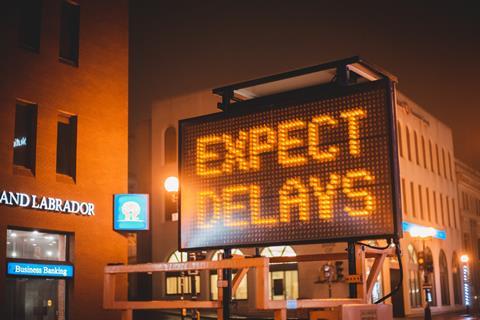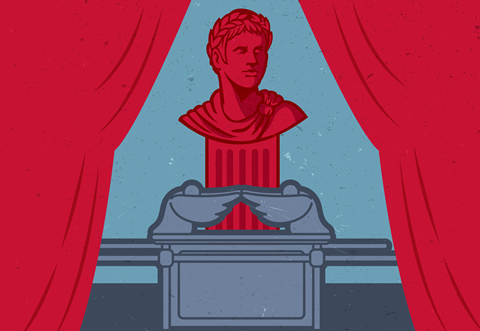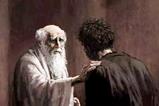In the first century, something or someone stopped Jesus’ second coming. David Instone-Brewer explores what happened and asks: What is it that is holding him back today?

Here’s how I remember the emperors in the New Testament: Augustus the dad, Tiberius the lad, Caligula the mad, Claudius the sad and Nero the bad.
Augustus was reigning when Jesus was born and started this family of emperors. His stepson, Tiberius, who was famous for his orgies, was ruling when Jesus died. He was succeeded by his adopted son, Caligula, a certifiable megalomaniac; he made his favourite horse, Incitatus, a priest and wanted to appoint him head of the senate.
Claudius never wanted to be emperor – he was a quiet, studious historian; however, he did a good job and even established the empire in England. Tiberius and Caligula were notoriously cruel, but Nero was the nastiest end of this family line; he burned Christians on poles to light up his evening garden parties. Dad, lad, mad, sad and bad.
The end of the world
Nowadays the world might end by nuclear MAD (Mutually Assured Destruction) but it almost ended in the first Century because mad Caligula wanted to be worshipped as a god, even in Jerusalem. He commanded that his statue be put up in every synagogue, and he sent one to Jerusalem to be placed in the Holy of Holies of the temple. This started an absolute panic.

Daniel’s prophecy regarding the end times spoke about an event just like this: “at the temple he [‘the ruler who is to come’] will set up an abomination that causes desolation” (Daniel 9:27). Every Jew knew that prophecy – Matthew certainly assumed it was familiar to his readers, referring to it in chapter 24:15, and Paul affirmed it: “the man of lawlessness…will exalt himself over everything that is called God or is worshipped, so that he sets himself up in God’s temple, proclaiming himself to be God” (2 Thessalonians 2:3-4).
For the Jews, this was a clear sign that the end of the world was about to come. Egyptian Jews begged Philo – a distant relative of king Herod Agrippa – to go to Caligula and plead against it, but he was thrown out by the emperor. Jews in Palestine wandered about in sackcloth and ashes; no work was done and no crops sown, which quickly led to famine. Every Jew in the empire was ready to revolt.
Caligula had an army in Syria ready to take over Palestine. The size of the threatened revolt would necessitate wiping out the whole country. The Old Testament prophets tell us what would have happened next. Because this was an existential threat against Israel, it would have resulted in God establishing his own king in Jerusalem (Zechariah 14:2-11).
What or who will have to be removed before the final end can arrive?
When people heard that Caligula’s statue had arrived by boat at Caesarea, tens of thousands filled the roads to prevent it being transported to Jerusalem. They invited the soldiers to kill them – they were all willing to die to stop this. But it was Caligula’s assassination that brought things to a peaceful end – just in time. The end of the world didn’t happen then – but the Bible says it will.
Paul’s second letter to the Thessalonians was sent a few years after these events. Did he commend those who prayed for the world to end, or those who had prayed against this ‘man of sin’ (NKJV)? Should Christians today pray for the end to come soon?
Paul had to be careful about what he wrote in a public letter, because asking believers to agree with undermining an emperor – even a former one who was mad – was sedition. He therefore used circumspect and mysterious language: “Don’t you remember that when I was with you I used to tell you these things? And now you know what is holding him back, so that he may be revealed at the proper time. For the secret power of lawlessness is already at work; but the one who now holds it back will continue to do so till he is taken out of the way” (2 Thessalonians 2:6-7).
Called to wait
Commentators have puzzled about the identity of “the one who now holds it back”. Who or what will have to be removed before the final end can arrive? Both those who believe in a rapture and those who believe the Church will suffer give the same answer: the Church. In Revelation, John describes seeing the final martyrs “who had been slain because of the word of God and the testimony they had maintained” (6:9).
They were calling for the final judgement to start, but “they were told to wait a little longer, until the full number of their fellow servants, their brothers and sisters, were killed just as they had been” (6:11). All of God’s witnesses will be killed before the end will come – when the Church “who now holds it back” is “taken out of the way”.
I’ve never heard anyone pray: “Don’t come yet, Lord, because my family and neighbours don’t yet believe” – but perhaps we should. Like the early suffering Church, we usually pray “maranatha” (ie “Come, Lord!” – 1 Corinthians 16:22; Revelation 22:20), and “Your kingdom come” (Matthew 6:10). But God calls us to wait – to stay as salt and light, and do his will, so that “your will be done on earth, as it is in heaven”. God delays, and invites our prayers for those who don’t yet know Jesus: “The Lord is not slow in keeping his promise, as some understand slowness. Instead he is patient with you, not wanting anyone to perish, but everyone to come to repentance” (2 Peter 3:9).
What if the Church hadn’t prayed against Caligula and subsequent enemies of God, so that Jesus had to return sooner? If they hadn’t prayed for “the peace of Jerusalem” (Psalm 122:6), staying as an underground spiritual army, that final day of judgement would have come already, and we wouldn’t have been born – or saved.






































No comments yet